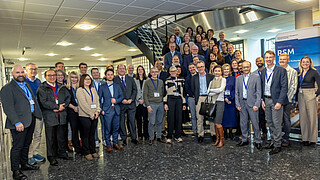Rubrics use was the main discussion point during Norwegian Business School's (BI's) recent visit to Rotterdam School of Management, Erasmus University (RSM). It is also a discussion that took centre stage during the Future of Management Education (FOME) Alliance conference at the end of December 2024, which was hosted at RSM and included delegates from BI and other prominent management institutions around the world.
Simplification and clarity in feedback
Rubrics can significantly simplify student and teacher feedback and create more transparency, making it an enormously efficient tool for universities. In instances where a structured and transparent grading system is non-negotiable, such as in large classes and for rigorous programmes, rubrics are essential.
During BI’s visit to RSM, hosted by Executive Director Quality & Innovation, Anna de Waard-Leung, Nilsen and Thøring were able to discuss rubrics and best practices with RSM faculty and staff, which included: Prof. Finn Wynstra; Doctors Khadija van der Straaten, Jan van Dalen, Mert Cetin, and Anna Nikulina; and Sahar Hofmeijer, Marijn van den Doel, and Pablo Ortiz de Zaldumbide Lucero.
Bringing stakeholders on board
Even though the incorporation of tools like this are a step in the right direction, change takes buy-in. “Being at the very centre of the rubrics question at our school,” said Nilsen, “it’s our responsibility to sell the idea both upstream to management and downstream to faculty.”
The BI representatives were pleasantly surprised to receive an excess of advice and support from the RSM colleagues with whom they met. Nilsen: “We are quite impressed with the intrinsic motivation and dedication of the RSM teachers in how they have incorporated rubrics in their classrooms, and with the valuable advice they have passed on to us.”
When asked about the expected payoff once the buy-in from the BI faculty and staff has been achieved, Thøring remarked, “We expect to see more clarity and time saved in both grading and in giving feedback, not to mention the reduction of the age-old pain point at most higher learning institutions: grade justification.”
HAPP and GenAI
Nilsen and Thøring’s campus visit also included a discussion with Dr Colin Lee, assistant professor in the department of Organisation and Personnel Management at RSM. Dr Lee is the developer of the highly regarded Harmonised Appraisal (HAPP) tool, which offers a roadmap for the introduction of rubrics. Dr Lee shared knowledge with Nilsen and Thøring about how HAPP could help to train the BI faculty in using rubrics and to embed best practices. Eventually, the conversation led to how Generative AI could help BI to deliver strong rubrics, and, after some trial and error, how it could potentially redefine assessments altogether.
RSM would like to sincerely thank Ms Nilsen and Ms Thøring for their time, insights and interest in discussing rubrics with the RSM faculty and staff. To learn more about RSM’s work with the FOME Alliance or about the use of rubrics at RSM, please contact Anna de Waard-Leung for more information.



